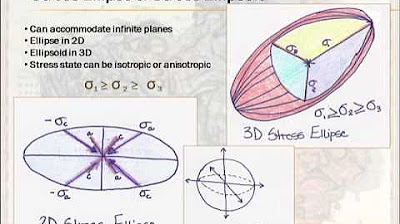GEOLOGI DASAR: LIMA HUKUM DASAR GEOLOGI - Video Kuliah Pembelajaran Daring Kolaboratif
Summary
TLDRIn this educational lecture, the fundamental laws of geology are explored, crucial for understanding geological processes. These laws include the Principle of Uniformitarianism, which posits that current geological processes are key to understanding the past, the Law of Original Horizontality, suggesting that rock layers were initially flat, and the Law of Superposition, indicating that the oldest rocks are at the bottom. Also discussed are the Principle of Crosscutting Relationships, which helps determine the relative ages of rock layers, and the Principle of Faunal Succession, which uses fossils for correlation. These laws are essential for studying the Earth's history and predicting future geological events.
Takeaways
- 📚 The fundamental laws of geology are crucial for understanding geological processes and the formation of rocks over time.
- 🔍 The Law of Uniformitarianism suggests that the geological processes active today were also active in the past, allowing us to predict future geological changes based on past events.
- 🌊 The Law of Original Horizontality posits that rock layers were originally deposited horizontally, with exceptions due to tectonic forces or erosion.
- 📈 The Law of Superposition states that in an undisturbed sequence of rock layers, the oldest layers are at the bottom and the youngest at the top.
- ✂️ The Principle of Crosscutting Relationships indicates that a geological feature that cuts across other layers is younger than the layers it cuts through.
- 🐚 The Principle of Faunal Succession, introduced by William Smith, uses the presence of fossils in rock layers to correlate and date geological strata across different regions.
- 🏔️ The script discusses how the discovery of coral fossils in the Himalayas suggests that the region was once an ocean floor, illustrating the application of the Law of Uniformitarianism.
- 🌐 The concept of continental drift is mentioned, with the idea that continents were once joined and may come together again in the future, reflecting geological changes over time.
- 🏞️ The Grand Canyon is used as an example to illustrate how rock layers that were initially horizontal can be tilted or deformed due to tectonic forces.
- 🌋 The script also touches on the idea that geological processes like erosion and intrusion can alter the original position and appearance of rock layers.
Q & A
What is the significance of basic geological laws in the study of geology?
-Basic geological laws are fundamental for understanding the formation, arrangement, and relationships between rocks in both space and time. They provide the foundation for studying geological processes and interpreting Earth's history.
What is the Law of Uniformitarianism in geology?
-The Law of Uniformitarianism states that the geological processes occurring today are the same as those that happened in the past. This principle, summarized as 'the present is the key to the past,' helps geologists predict future geological events by studying past occurrences.
Can you provide an example of the Law of Uniformitarianism?
-An example is the presence of coral limestone found at the summit of the Himalayas, indicating that this area was once underwater in the distant past, similar to how coral reefs form in modern oceans.
What does the Law of Original Horizontality state?
-The Law of Original Horizontality states that layers of sediment are originally deposited horizontally. If rock layers are found tilted or folded, it indicates that tectonic forces deformed them after their deposition.
What does the Law of Superposition describe?
-The Law of Superposition explains that in an undisturbed sequence of rock layers, the oldest layers are at the bottom, while the youngest layers are at the top.
How can the Law of Superposition help in determining the age of rocks?
-By examining the order of rock layers, geologists can identify which layers are older and which are younger, helping them build a chronological sequence of geological events.
What is the Principle of Crosscutting Relationships?
-The Principle of Crosscutting Relationships states that if one geological feature cuts across another, the feature that has been cut is older. The cutting feature is always younger than the rock it intrudes.
Can you provide an example of the Principle of Crosscutting Relationships?
-If a fault or igneous intrusion cuts through several rock layers, the fault or intrusion is younger than the layers it disrupts. For example, an igneous intrusion within sedimentary layers would be younger than the layers it penetrates.
What is the Principle of Faunal Succession in geology?
-The Principle of Faunal Succession states that fossils within rock layers follow a specific, predictable order. This allows geologists to correlate rock layers across different regions based on the fossils they contain.
How does the Principle of Faunal Succession assist in geological correlation?
-By comparing fossil content across different rock outcrops, geologists can establish a correlation between them, determining that they were formed during the same geological time period based on shared fossil species.
Outlines

This section is available to paid users only. Please upgrade to access this part.
Upgrade NowMindmap

This section is available to paid users only. Please upgrade to access this part.
Upgrade NowKeywords

This section is available to paid users only. Please upgrade to access this part.
Upgrade NowHighlights

This section is available to paid users only. Please upgrade to access this part.
Upgrade NowTranscripts

This section is available to paid users only. Please upgrade to access this part.
Upgrade NowBrowse More Related Video

Relative Dating of Rock Layers

IITK NPTEL Structural Geology_Lecture 02: Introduction II [Prof. Santanu Misra]

Structural Geology - Lesson 2 - Stress and Strain

Pembahasan OSNK Kebumian 2024 NO 1-3

Geologi Struktur - Deformasi - 1. Cakupan Geologi Struktur

Praktikum Geologi Struktur 2024 - Modul 1. Pendahuluan Modul Geologi Struktur - 2. Pengukuran Data
5.0 / 5 (0 votes)